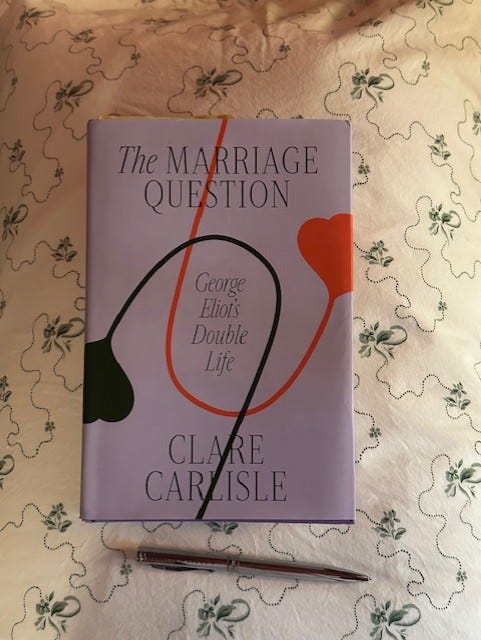Review of THE MARRIAGE QUESTION
Further down the road of MIDDLEMARCH and the wonderfully layered worlds of George Eliot and her interlocutor, Clare Carlisle ...
In my last newsletter, I discussed the three non-fiction books that have shaped my thinking the most in my life. Carlisle’s The Marriage Question (the Double Life of George Eliot) might qualify if a new list had to be made. There is much to say about this short, dense, and electrifying journey with a Cambridge literary philosopher as she navigates the writings and life of George Eliot or, more accurately, Marion Evans Lewes.
Let’s get a few facts on the table before I try to take a brief dive into this brilliant book.
George Eliot was born Mary Ann Evans. She changed her name to Marian at age 32. She then adopted her partner’s name and was Marian Evan Lewes for 24 years until the death of her beloved George Lewes. George Lewes could never secure a divorce from his wife, who bred an entire family with her lover, and thus he and Marian always lived in the shadowlands of scandal. At age 37 she created the nom de plum of George Eliot in order to publish her earlier works. It would remain her public authorial name for much of her life. After George’s death she would marry, at age 59, for the first time to a much younger John Cross and adopt his last name. Cross would shortly thereafter suffer a breakdown and commit suicide. Eliot/Evans/Lewes/Cross would only survive him by eight months. THUS … the “double life” of George Eliot. THUS … the central role of “the marriage question” not only in Carlisle’s biography but in everything Eliot wrote.
George Eliot wrote in the height of the Victorian Golden Age of literature. Like Dickens, her books were serialized. Her first novel, Adam Bede, was a stunning success and put her on the map. In time she was more popular than Charles Dickens. Her novels made her modestly wealthy.
Despite several flattering portraits, Eliot was very unattractive. Nonetheless, George was not the only man to fall in love with her. Her voice was beautiful, her conversation brilliant, her heart full. She helped George with his adult sons but never had a child of her own.
The Lewes lived much of their life overseas, escaping the innuendo and pain that came with their living together. Their unmarried status was anathema to the Victorian world that surrounded them. No measure of success or fame could fully wash this blemish away.
(If you do not want to follow me further in this brief and limited unpacking, I suggest looking up James Woods’ extraordinary review in The New Yorker. It led me to Carlisle.) There are several portals through which to approach this book. The central one is the role of marriage in Eliot’s works, in the society around her and in our lives as humans. Carlisle and Eliot become almost indistinguishable on this question of marriage - THE central question around which so much of the great literature of the 19th century revolved. Both the biographer and her subject see marriage as the intersection of the cosmic questions that come with our mortal selves and the social means we employ to navigate, consciously or not, these questions. The role of the woman in this marital world is where all the strengths and weaknesses of this timeless arrangement come together. In the hands of Carlisle, Eliot is not a towering 19th century feminist. While deeply angered by the often-violent misogynistic world of Victorian Britain, Carlisle’s Eliot operates at a higher level. Outrage is dwarfed by the sublime. This leads us into the next portal. Carlisle is a literary scholar of philosophy. (She joins Jill Lepore on my shortlist of professors I hope to meet in an afterlife.) Carlisle weaves her deep knowledge of Spinoza and Herbert Spencer (two philosophers who materially influenced Eliot’s writings) into her narrative thus expanding The Marriage Question into an accessible and thrilling journey through 250 years of philosophy. Middlemarch is no longer just a study of marriage; it is seminar about individual freedom and the burden of choice. Its provincial location is not only familiar to Eliot, but it also protects and reinforces the ‘everyman’ nature of the internal worlds of her characters. Without the distraction and drama of Dickensian London, the characters of Middlemarch are embedded within the reader through the often tortured moral, philosophical, and theological worlds they either navigate or avoid. This opening up of her novels is the great strength of Carlisle’s book. Finally, the mosaic of Eliot’s actual life and those rendered in her novels lead you to understand why the like of Virginia Woolf and Sigmund Freud so admired her work. With deep learning and erudition backing her up, Carlisle’s Eliot is a woman who transforms pain, love, and uncertainty into timeless and sublime art.
The Marriage Question
George Eliot’s Double Life
By Clare Carlisle
2024 272 pages (before Notes)


